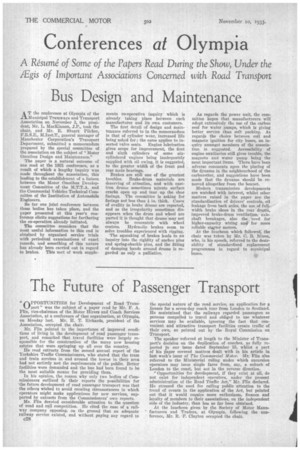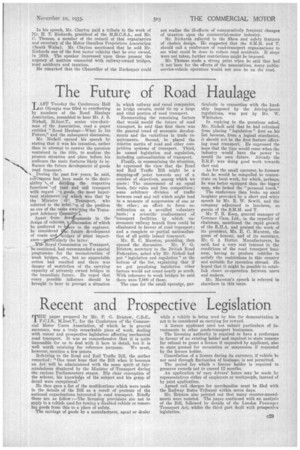The Future of Passenger Transport
Page 58

Page 59

If you've noticed an error in this article please click here to report it so we can fix it.
" r‘FPORTUNITIES for Development of Road Trans port" was the subject of a paper read by Mr. F. A. P1M, vice-chairman of the Motor Hirers and Coach Services Association, at a conference of that organization, at Olympia, on Mosiday last. Mr. H. T. Rickards, president of the Association, occupied the chair.
Mr. Flin pointed to the importance of improved conditions of living in the development of road passenger transport, and remarked that travel facilities were largely responsible for the construction of the many new housing estates that were springing up all over the country. He read extracts from the second annual report of the Yorkshire Traffic Commissioners, who stated that the tram and train services in and around the towns in their area had not entirely met the requirements of the public. Better facilities were demanded and the bus had been found to be the most suitable means for providing them. In his opinion, the reason why only two bodies of Commissioners outlined in their reports the possibilities for 'the future development of road passenger transport was that the others wished to avoid creating circumstances in which operators might make applications for new services, supported by extracts from the Commissioners' own reports. Mr. Film devoted considerable attention to the question of road and rail competition. He cited the case of a railway company opposing, on the ground that an adequate railway service existed, and without paying any regard to
c28
the special nature of the road service, an application for a licence for a seven-day coach tour from London to Scotland. He maintained that the railways regarded passengers as persons compelled to travel and obliged to use whatever services may be available, ignoring the fact that convenient and attractive transport facilities create traffic of their own, as pointed out by the Royal Commission on Transport.
The speaker referred at length to the Minister of Transport's decision on the duplication of coaches, as fully reported in our issue dated September 15, whilst a part of his paper covered matters dealt with in his article in last week's issue of The Commercial Motor. Mr. Flin also referred to the Ministerial ruling under which excursion operators may issue single fares from, say, a suburb of London to the coast, but not in the reverse direction.
"Opportunities for development, if they exist at all, do not exist for independent operators, under the present administration of the Road Traffic Act," Mr. Flin declared. Ho stressed the need for calling public attention to the trend of events in the application of the Act, but pointed out that it would require more enthusiasm, finance and loyalty of members to their associations, on the independent side of the industry, than has so far been obtained.
At the luncheon given by the Society of Motor Manufacturers and Traders, at Olympia, following the conference, Mr. R. .F. Clayton occupied the chair.
In his speech, Mr. Clayton paid a tribute to the work of Mr. H. T. Rivkards, president of the M.E.C.S.A., and Mr. C. Thomas, a member of the council of that organization and secretary of the Motor Omnibus Proprietors Association (South Wales). Mr. Clayton mentioned that he sold Mr. Rickards one of the first motor vehicles that he ever owned, in ,1910. The speaker impressed upon those present the urgency of matters connected with railway-owned bridges, road accidents and taxation.
He remarked that the Chancellor of the Exchequer could not realize the ill-effects of comparatively frequent changes of taxation upon the commercial-motor industry.
Mr. Rickards referred to the show and safety features of chatsis design. He suggested that the S.M.M. and T. should call a conference of road-transport organizations to see what could be done to reduce road accidents. If steps were not taken, farther restrictions might he imposed.
Mr. Thomas made a strong point when he said that had it not been for the efforts of the associations, many publicservice-vehicle operators would not now be on the road.




























































































































